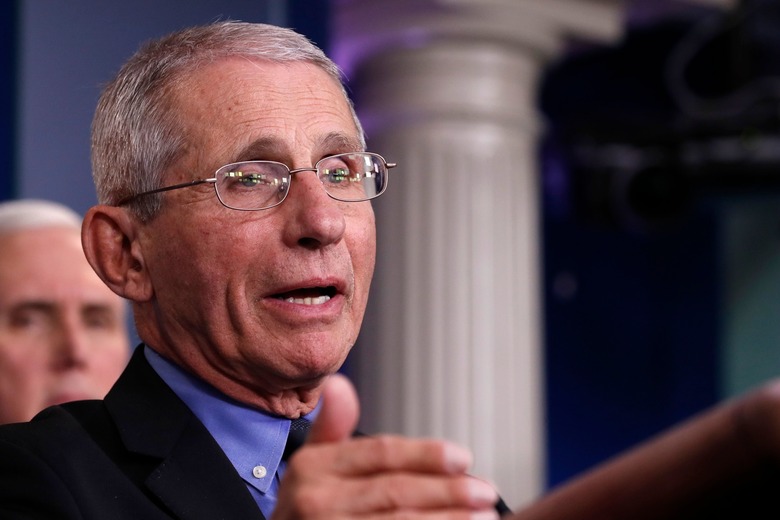Fauci Just Criticized Vaccine Maker Moderna For Doing The Same Thing He Did
- The first novel coronavirus vaccine that reached human trials in the US comes from Moderna. It's an mRNA drug that shows promise, according to an announcement from the company that delivered partial results.
- Moderna's coronavirus drug announcement was incomplete and prompted some criticism from scientists who wanted access to the full data set.
- Dr. Anthony Fauci just expressed his own dissatisfaction at seeing Moderna's press release but reiterated his conviction that the treatment is promising.
- Fauci did the same thing himself a few weeks ago when he released preliminary results about remdesivir without waiting for the full study to be ready.
When Dr. Anthony Fauci announced the promising results of a massive remdesivir trial that the National Institutes of Health conducted, he did so without waiting for the proper research to be published in a medical journal. The remdesivir study results weren't published until several weeks later, delivering the same conclusions Fauci offered from the White House in late April. But Fauci is now unhappy with vaccine maker Moderna for the way it announced promising results for what could end up being one of the first vaccines for the novel coronavirus.
Moderna announced a few days ago that the vaccine candidate it's been working on has generated the neutralizing antibodies that can block the replication of SARS-CoV-2. But the data wasn't complete and it came via a press release rather than in a published study. Moderna's stock skyrocketed and the company announced a new public offering hours later, via a different announcement. News then came that some execs sold stock at the same time, in what was a previously planned move. There's no indication that any laws were broken, but it certainly wasn't a good look for the company.
The world noticed that Fauci and NIAID were quiet on the matter, even though they partnered with Moderna for this coronavirus vaccine candidate. The drug is one of the first to have hit Phase 1 trials, and certainly the first vaccine candidate to inoculate US volunteers. It's the same drug that Fauci said a few weeks ago could be ready by early 2021.
The infectious disease expert explained in a follow-up interview that Moderna's announcement did deliver good news. The drug appears to be safe and can elicit the immune response needed to block the coronavirus.
Fauci finally addressed Moderna's recent vaccine revelations in a new interview with Stat. "I didn't like that," Fauci said while doubling down on the fact that Moderna's partial data is still good enough. "What we would have preferred to do, quite frankly, is to wait until we had the data from the entire Phase 1 — which I hear is quite similar to the data that they showed — and publish it in a reputable journal and show all the data."
He added that the company got excited when they saw the positive data, and put it all in a press release.
As a reminder, Fauci released data from the remdesivir study several weeks before it was published in a reputable journal and before all that data was shown to the world. Unlike Moderna's incomplete data set, Fauci relayed most of the information from the study, including the fact that remdesivir can't reduce COVID-19 mortality. It also said that another drug may be needed alongside remdesivir to improve coronavirus therapies.
Once published, the remdesivir study received some criticism. Some said the study should have not ended prematurely for some placebo patients, and others pointed out that the study changed its objectives halfway through.
That said, there are differences between Fauci and Moderna's early announcements. The doctor is involved in the White House's COVID-19 taskforce, and he's in a position to make informed decisions and announcements about new therapies. The remdesivir conclusions were apparently ready, compared with Moderna's which only had data from eight of the 45 volunteers. The remdesivir study was also conducted worldwide, including more than 1,000 patients.
Additionally, Fauci's remarks came at a time when the controversial drug hydroxychloroquine may have been more popular with the public. That's a drug that has yet to show promise in COVID-19 treatment. In fact, it might make coronavirus infections even worse. Fauci's remdesivir arguments were based on scientific data, even if unpublished in a journal. They offered the public a different perspective on addressing novel drug therapies for a disease that's been ravaging the country. Fauci made it clear more than once that hydroxychloroquine should not be used without supporting data, often responding to questions about Trump's bizarre love for hydroxychloroquine. But many people hurried to buy the anti-malarial for COVID-19 use nonetheless.
In the interview with Stat, Fauci also addressed a different vaccine candidate that's in testing in Germany and the US. That's Pfizer's mRNA drug made by German company BioNTech, which could be ready by October. "The Pfizer one is very similar to Moderna's," Fauci said. "It's an mRNA vaccine. I'm sure that Pfizer is going to get results that are as good as the Moderna vaccine. There's no reason to believe one is going to be any different than the other."
The NIAID director said that the 12 to 18 months needed for a widely distributed coronavirus vaccine is "aspirational, but it's certainly doable."
He continued, "The only thing that's the big unknown to me is that, is it going to be effective? I think we could do it within the time frame that I've outlined. But there's no guarantee that it's going to be effective."
